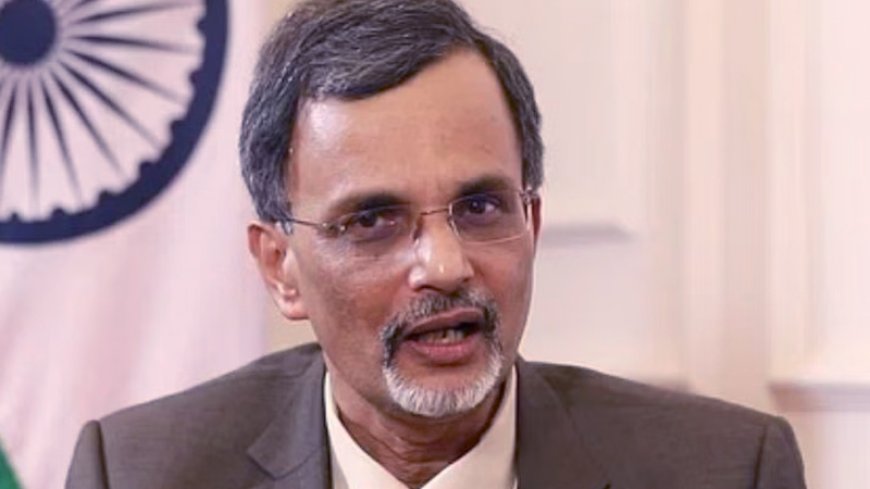India Must Cut Supply-Chain Dependence on Critical Imports: CEA Nageswaran's Stark Warning Amid Global Volatility
India’s Chief Economic Advisor, Anantha Nageswaran, has raised concerns about the country’s over-reliance on imported digital machinery, lithium-ion batteries, and penicillin. Learn why this matters in today’s shifting global landscape.

A Wake-Up Call for India’s Economic Resilience
In a timely and pointed address, India’s Chief Economic Advisor (CEA), Dr. V. Anantha Nageswaran, has flagged the country’s growing vulnerability due to its dependence on critical imports like digital machinery, lithium-ion batteries, and penicillin. Speaking during a recent policy forum amid heightened global economic tensions, Nageswaran underscored the urgent need for India to diversify and localize its supply chains before it becomes too costly to do so.
As the world grapples with geopolitical unrest, economic fragmentation, and increasing trade protectionism, Nageswaran's remarks highlight a strategic fault line in India’s economic framework — one that could undermine long-term growth and national security if not swiftly addressed.
Digital Machinery: A Silent Dependency
Digital infrastructure is the backbone of India’s rapidly growing digital economy, from cloud computing to data centers and manufacturing automation. However, much of the hardware that powers these systems is imported, primarily from East Asia and Europe.
According to government data, India imports a significant portion of its advanced electronic components and digital machinery from countries like China, South Korea, and Germany. This reliance exposes the Indian economy to serious risks in the event of trade disruptions or diplomatic strain.
Nageswaran warned that, “We are participating in the digital economy enthusiastically, but the machinery we depend on to run it is largely sourced from outside our borders. That’s a strategic concern in a digitally governed world.”
Lithium-Ion Batteries: The EV Dilemma
India’s ambitious plans to become a global electric vehicle (EV) hub may be hamstrung by its almost complete dependence on imported lithium-ion batteries. Despite strong demand from the automotive and electronics industries, domestic battery manufacturing remains in its infancy.
India imported over $3 billion worth of lithium-ion batteries in the last fiscal year alone, according to figures from the Ministry of Commerce. Most of these imports come from China — the world’s dominant player in the lithium supply chain.
The CEA emphasized the importance of developing indigenous battery production capabilities, stating, “Without securing our own access to critical technologies like energy storage, we are building castles on sand.”
Penicillin and Pharma: An Overlooked Risk
While India is often referred to as the “pharmacy of the world,” the country imports a significant volume of active pharmaceutical ingredients (APIs) — particularly antibiotics such as penicillin — from a narrow group of countries, predominantly China.
This imbalance creates vulnerabilities, not only economically but also in terms of public health security. A global supply disruption could leave India exposed to critical shortages.
Nageswaran pointed out, “Even in sectors where we appear strong, like pharmaceuticals, our dependency on key ingredients imported from abroad can quickly turn into a national crisis during supply shocks.”
Rising Global Volatility: The Timing Couldn’t Be More Urgent
The global economic order is facing a paradigm shift. Geopolitical flashpoints, including the Russia-Ukraine conflict, tensions in the Indo-Pacific, and the increasing weaponization of trade, have all contributed to growing uncertainty.
Supply chains, once seen as efficient and globalized, are now being re-evaluated through the lens of resilience and strategic autonomy.
Nageswaran’s remarks come at a moment when India is also striving to position itself as a reliable manufacturing alternative to China under the “Make in India” and “Atmanirbhar Bharat” initiatives. But these ambitions will fall short unless there is meaningful investment in domestic capabilities across critical sectors.
Policy Recommendations and Road Ahead
To reduce this reliance, Nageswaran advocated for:
-
Public-private partnerships in high-tech manufacturing
-
Incentives for R&D and domestic production of advanced digital machinery and battery technologies
-
Strategic stockpiling and the development of local substitutes for critical pharmaceutical ingredients
-
Diversifying import sources to avoid over-concentration on single countries
He also urged greater collaboration between academia, industry, and government to develop long-term capabilities in these areas. “We can no longer afford to take supply chain stability for granted,” he said.
Conclusion: Strategic Autonomy or Strategic Risk?
Anantha Nageswaran’s warning is not just economic; it is strategic. In a world where economic resilience is becoming as important as military preparedness, India’s over-reliance on critical imports could become a major liability.
As the country eyes a $5 trillion economy target, ensuring robust, resilient, and diversified supply chains will be crucial. The message from the Chief Economic Advisor is clear: self-reliance is not a political slogan — it’s an economic necessity.














